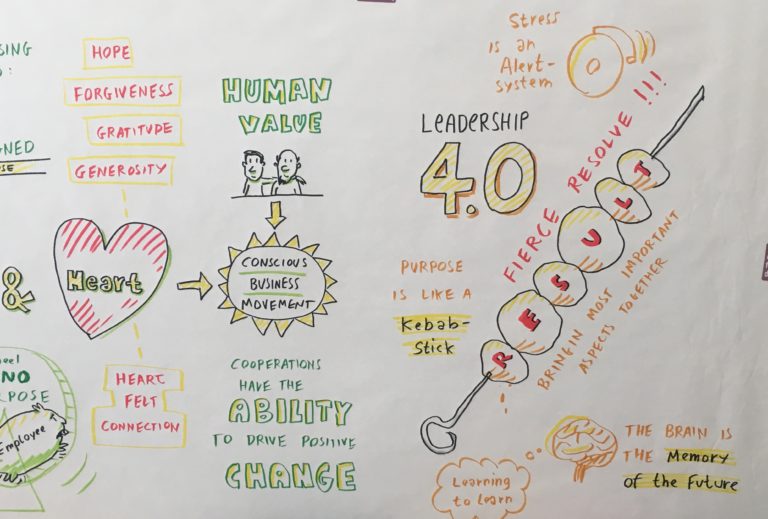No Success without Your Rome!
Quintessence of a congress about how to be successfully self-employed
My girl friend Caroline , a great sales expert is currently going on her next career step in self-employment and asked me if I would accompany her to a congress in Switzerland.
On the way to the congress, we made a stop at a befriended gifted wood sculptor who took part in wonderful exhibition in nature, before we arrived with our yellow VW bus for our first day of the congress.
It’s all about why you are doing what you are doing
Although all 14 speakers had their specific topic, they all agreed on one point. The most important thing is that you know why you are doing what you are doing. After all, your only real factor for success is your destiny. Everything else is tools and strategies. Certainly relevant, but they lose their full effect if you lack a full and clear understanding of your motivation. A lack of passion for your topic matched with your motivation can not make up for any marketing or sales expertise.
A few short excerpts from some talks in relation to the real success factor:
Dr. Renée Moore
The positioning and sales expert explains the process of positioning in 4 steps:
- Find your “Zone of Genius”, how she calls the purpose
- Define your ideal clients
- Summarize the results your product brings
- Build credibility
….and then she encourages the audience, to take imperfect action, not without emphasizing 5 times that nothing works without knowing our destiny.
Prof. Dr. Lothar Seiwert
The time management expert opens his presentation with the statement, that the bottom line of all success is strategy. He states that one should focus on the most effective point; or in other words, find, what he calls the the “minimum factor”. Find the bottleneck of your client and concentrate your energy to find a solution for just that.
At the end of his presentation, however, he illustrates impressively that even without a “picture frame” the best strategy is of no use. The picture frame represents our immovable part, our “why”. In the picture frame there are many individual puzzle pieces, which are subject to constant change, but always have to fit its frame.
Ralf Bihlmaier
Ralf Bihlmaier is a mental coach researching motivations of human behavior. He says that the only reason for a change is ourselves and we are the creators of our life. Whoever has consciousness about himself is self-confident. This means that if you know yourself, you can communicate without fear. As long as you are afraid you will not solve the problems of others. And finally, if you are not you, you are not selling.
Stefan Merath
Today Stefan Merath is an online business expert. He shares his story of being a successful entrepreneur, who failed when he had taken on the role of the executive director, leaving him no time to commit himself to his vision. He described how he became a slave to his own company until bankruptcy freed him and made it a new starting point for his life. There are two aspects to success, he says:
- Inner game
- Methodological aspects
The methodological aspects are simple, but the inner game is the difficult one and the inner game will decide on success or failure. You have to align your actions with your inner motivations.
Anja Mahlstedt
She is a career and leadership expert talking about the structure of the I-brand.
By asking, “what can I do for you” she expresses her mental attitude towards her customers. I like her statement in which she encourages to polarize, so customers know who they are dealing with. But she also points out, that you can only do so, when you’re solid, knowing who you are. I agree when she says, that in passion you find life and in reason only mediocrity. Towards the end of her talk, she reveals a creative idea for people to remember you. Take 3 attributes that describe you best and create a short slogan. When she meets people, she uses the first 3 letters of her attributes and she says: Hello, I’m KZS … and then tells her slogan. This is unusual and it remains in the memory of the people. Your USP is what you want to anchor in your customers and that is reflected in the 3 attributes.
Maxim Mankevich
Mankevich, expert for success knowledge enters his presentation with the questions: What is your purpose? What are you here for? Without 100% self-love and respect you can not be successful, adding with a grin that he takes the word respect for the men. Like Anja Mahlstedt, he emphasises a mental attitude that is oriented towards serving. Success is voluntary he says, and he describes the path in 3 steps:
- Acceptance
- Inspiration
- Creation.Creation means to get into your “Gamma Wave”. Gamma brainwaves are the fastest documented brainwave activity in an EEG. Ideas need silence, magical things, loving vibration and a spiritual attitude of service, states Mankevich.
Raho Bornhorst
Bornhorst’s background is training as a baker, marketing and psychology, until he became an expert in holistic awareness. He stands for what he calls “radical self-love”. By radical, he means that everything that does not fit our love needs to be “burned”. There are only 2 crash barriers and that is love and joy. He navigates people from the current state to success. He too is convinced that there is only one real goal for every human being, but many different ways to get there.
Again, a simplified 3-step system in which A. stands for the status quo, B. for the goal, he also calls it your “sun” and C. for the obstacles. Write down all C’s and then think about how you “burn” them. Happiness is a whore, she sleeps with the dilligent, he concludes his talk 😉
Elmar Rassi
Marketing and life expert, tells his story of his carefree childhood which was transformed by the outbreak of war into a story of fear of death, escape, depression and finally the question of his “why”. After experiencing fear of death, there was nothing left to fear for, he tells us, and this experience causes him to bravely go in search of his purpose. Today he sees not only in himself, but also in others, that great success is recruited from one’s own history and runs like a thread through life. He takes stock that every strong brand has a strong story and encourages each of us to find our story.
Umberto Saxer
This man was a personal challenge, as he was irritating me with his is strange humour. I noticed how I was inclined to switch off. But I chose to recognise the situation as an opportunity, and so my mind became all the more alert and keen. I felt confirmed when he said that if we enjoy learning, our brain is most networked. Approved, I though to myself 😉
His topic is sales cybernetics, thus controlling sales goals. He stresses how important it is to think in terms of opportunities and cites two simple but effective examples.
- In your home, a power outlet is broken and you order an electrician to repair it. Most electricians repair this outlet and they see their work as done. As a successful seller, however, they would also control all the other sockets in the house to make sure they all function well.
- A customer buys a laptop. In this case, one would also consider to ask the customer if he need a suitable laptop bag, a mouse, an external hard drive or even a printer.
The question of the seller must always be: What are the other goals of this customer? What is the story why the customer buys the product or service? Another equally important question: What do I want to reach if the customer does not buy? Maybe your product does not suit the customer, but he will find you likeable and trustworthy and will continue to recommend you.
Finally he sums up, that we have to reach the emotions of our customers. These are not to find in the features of our products, but in the benefits of the products. Selling successfully is nothing more than being able to establish a successful relationship with people. And a valuable connection has been built only, if we are successfully connected within ourselves.
Bottom line:
Our business success correlates 100% with our personal development. The better we know ourselves, the more we are ourselves, the more we dare to leave our comfort zone, accepting the challenges of life, the happier and more successful we will be. The separation of private and business is a purely rational one. In reality, there is only one holistic person. The psychological separation can even be destructive. To be successful, we must recognize ourselves as a whole human being acting in our destiny.
Tell me about your experiences. Do you agree with me that success reflects 100% of your personal development?
Be yourSelf-Leader!
Sincerely yours, Yvonne





